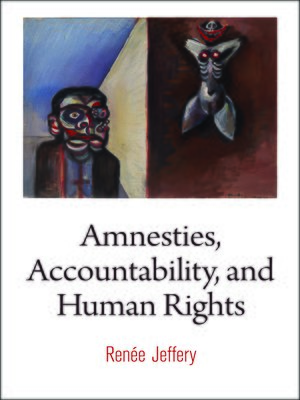Amnesties, Accountability, and Human Rights
ebook ∣ Pennsylvania Studies in Human Rights
By Renée Jeffery

Sign up to save your library
With an OverDrive account, you can save your favorite libraries for at-a-glance information about availability. Find out more about OverDrive accounts.
Find this title in Libby, the library reading app by OverDrive.



Search for a digital library with this title
Title found at these libraries:
| Library Name | Distance |
|---|---|
| Loading... |
For the last thirty years, documented human rights violations have been met with an unprecedented rise in demands for accountability. This trend challenges the use of amnesties which typically foreclose opportunities for criminal prosecutions that some argue are crucial to transitional justice. Recent developments have seen amnesties circumvented, overturned, and resisted by lawyers, states, and judiciaries committed to ending impunity for human rights violations. Yet, despite this global movement, the use of amnesties since the 1970s has not declined.
Amnesties, Accountability, and Human Rights examines why and how amnesties persist in the face of mounting pressure to prosecute the perpetrators of human rights violations. Drawing on more than 700 amnesties instituted between 1970 and 2005, Renée Jeffery maps out significant trends in the use of amnesty and offers a historical account of how both the use and the perception of amnesty has changed. As mechanisms to facilitate transitions to democracy, to reconcile divided societies, or to end violent conflicts, amnesties have been adapted to suit the competing demands of contemporary postconflict politics and international accountability norms. Through the history of one evolving political instrument, Amnesties, Accountability, and Human Rights sheds light on the changing thought, practice, and goals of human rights discourse generally.







